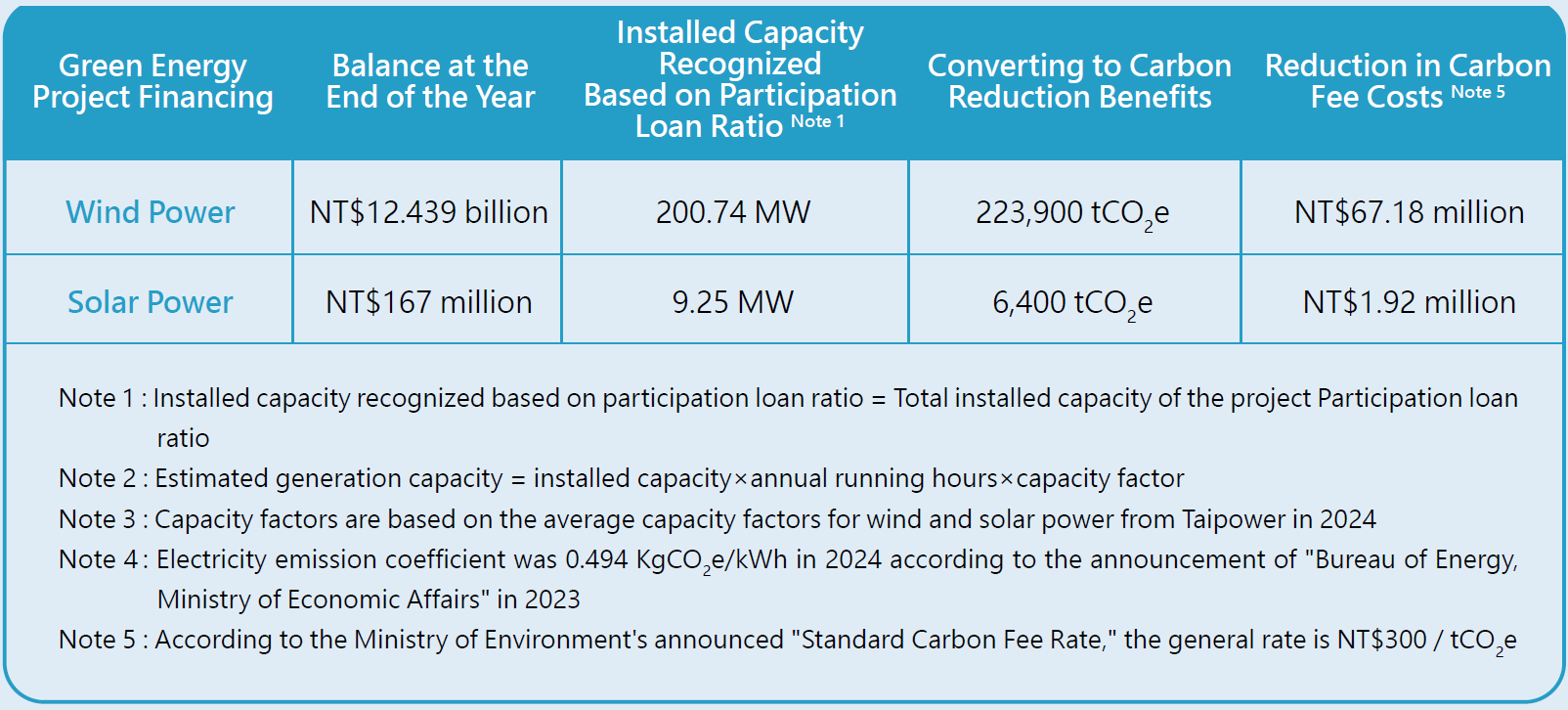Taiwan declared its commitment to achieving "Net Zero Emissions by 2050" in 2021 and identified "Green Finance" as one of the 12 key strategies towards this goal. The financial industry plays a vital role in establishing green finance mechanisms and implementing targeted measures, serving as an intermediary for funds and facilitating investments to support sustainable development. It has become an essential driving force in the transition to net zero emissions. Therefore, while climate change causes changes in the operational environment and necessitates additional expenditures to mitigate potential damages, it also presents opportunities for financial institutions.
KTB places a strong emphasis on climate change issues and sustainable development. It not only continues to enhance its climate risk management mechanisms but also actively develops financial products and services that are aligned with climate and sustainability goals. Integrating ESG (Environmental, Social, and Governance) considerations into its daily business processes, KTB leverages its influence in the financial supply chain to promote societal awareness and importance of sustainable development.


Sustainable Financial Management Policy
To further encourage all business units to integrate ESG factors into their business planning and operations, KTB has developed the "King's Town Bank Sustainable Finance Policy." This policy was approved by the Board of Directors and implemented across the entire Company. According to the policy, each business unit is required to include ESG factors in the evaluation criteria, taking into account the scope of their operations and service characteristics. As part of the customer due diligence process, their ESG performance should be assessed to identify any relevant risks and opportunities. The implementation status will be discussed by the ESG Team and reported to the Sustainable Development Committee as well as the Board of Directors. KTB's Sustainable Finance Management Policy is as follow:
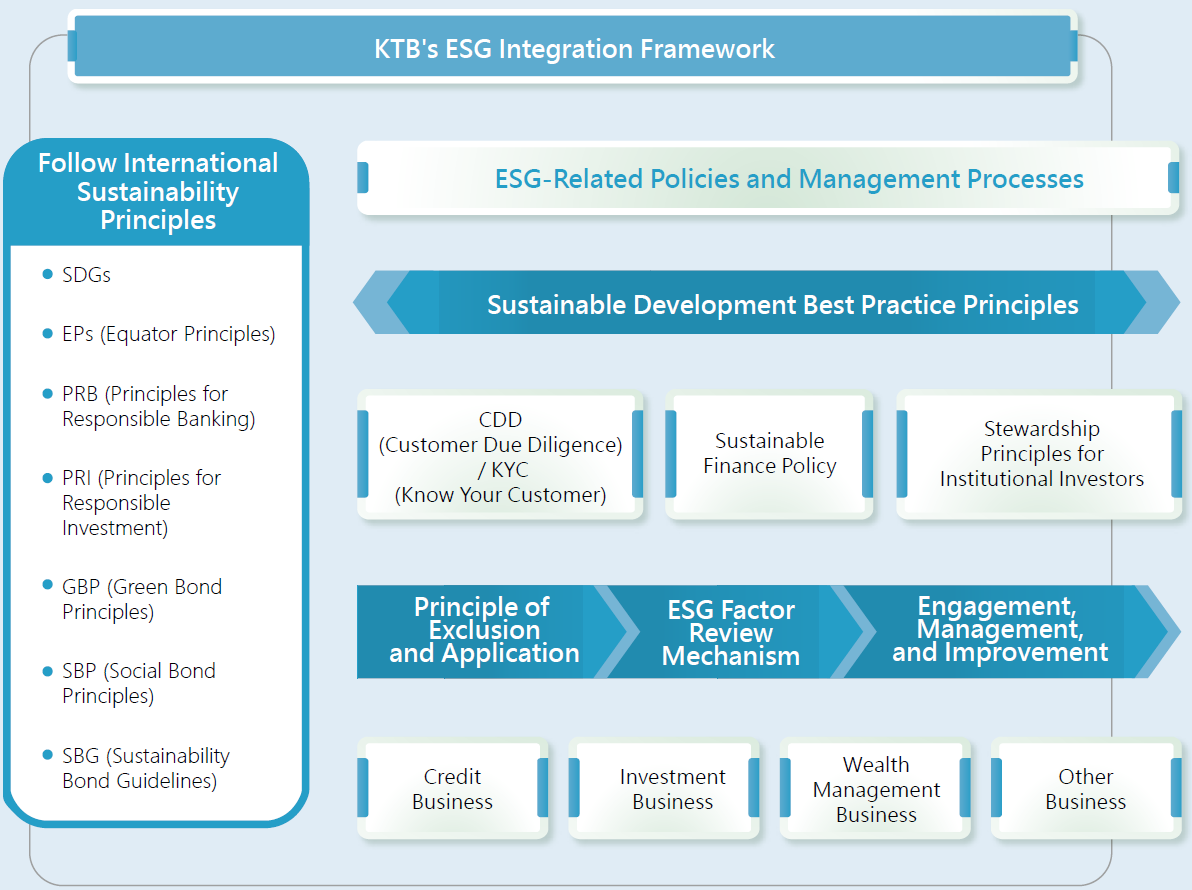
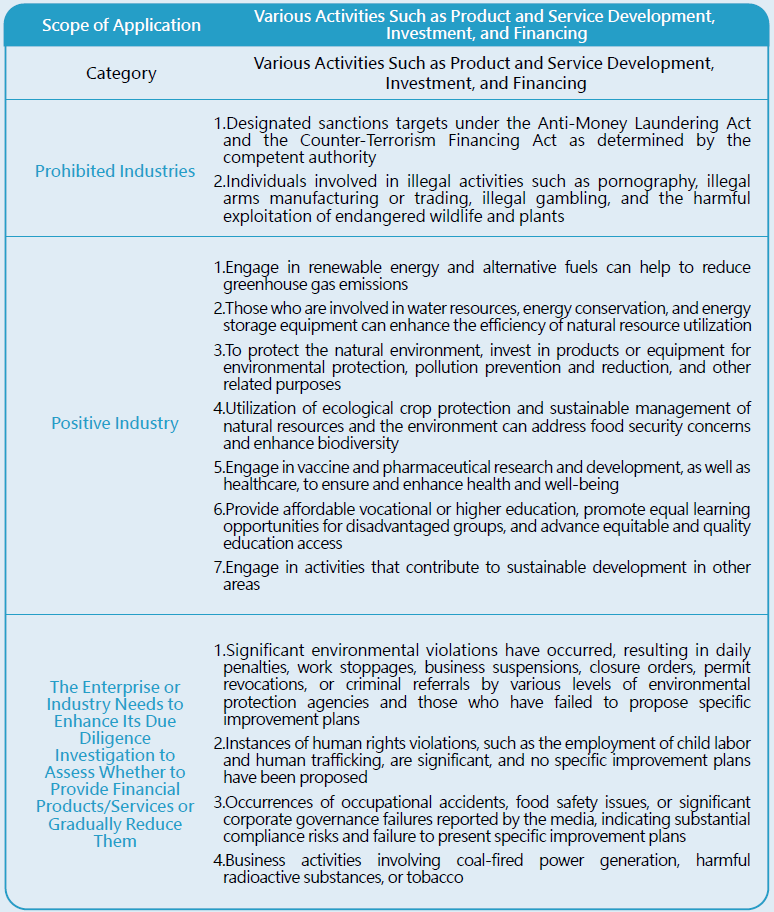
Before released loans to corporate customers, KTB reviews the loaning based on the 5P principle - people, purpose, payment, protection, and perspective, according to the borrower's situation, fund use, repayment source, guarantee of creditor's rights and borrower's prospect, also incorporates the enterprise's ESG status into the credit investigation process, such as whether it has been subject to major pollution penalties, whether it has been involved in civil and criminal litigation, whether there is any incident that has an obvious adverse impact on the operation or image of the enterprise, and the prospects and risks of the industry, such as policy directions and changes in laws and regulations. Moreover, the "King's Town Bank Co., Ltd. Guidelines for Credit Rating of Corporate Customers" and "King's Town Bank Co., Ltd. Guidelines for Credit Rating of Individual Customers" stipulates that, if the applicant's operation or business complies with ESG principles, it can be considered as extra points on the credit rating form. In addition, for enterprises that are beneficial to sustainable development, KTB also implements an internal award mechanism to encourage the sales employees to develop credit business of sustainable industries, so as to increase capital investment in eco-friendly industries, including green power, clean energy, circular economy, and health care.
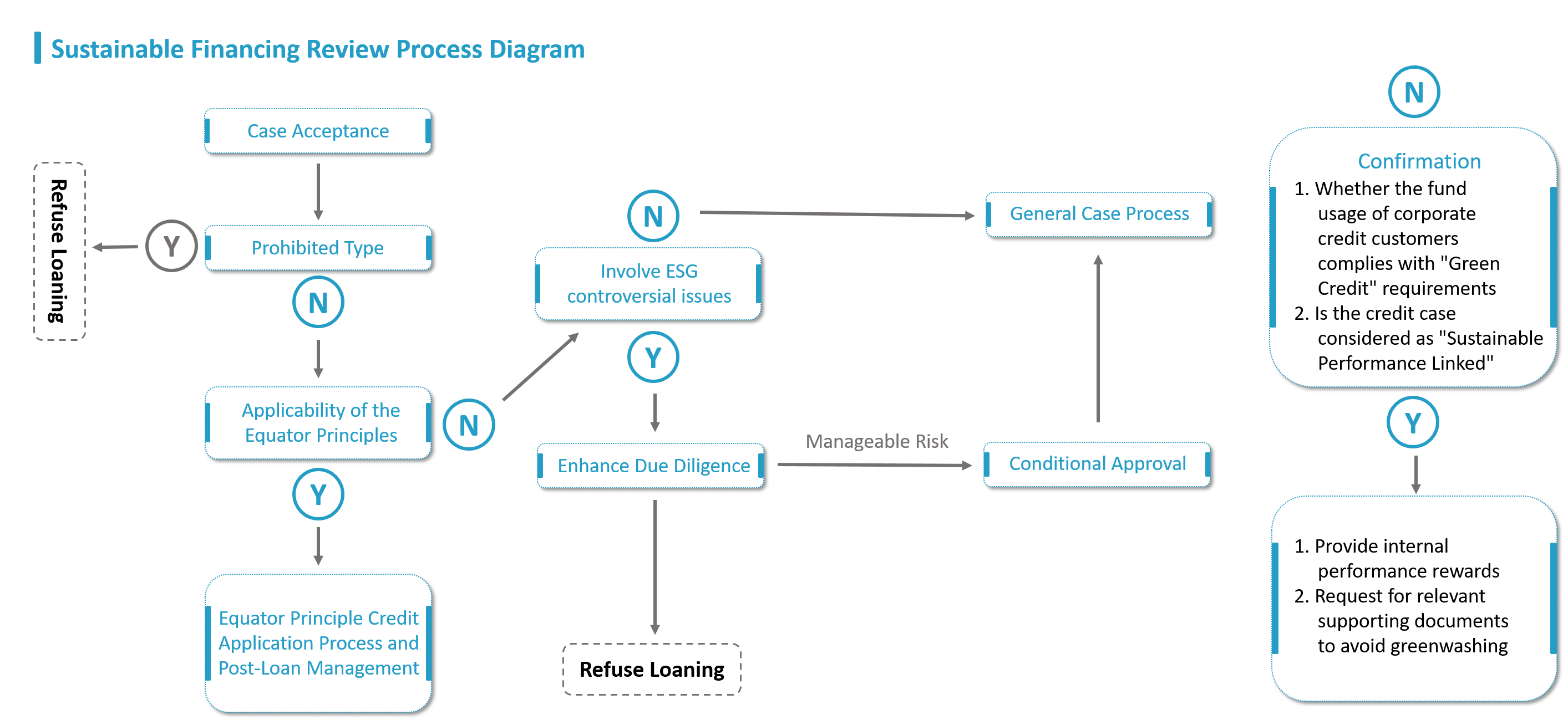
Sustainable Industry Financing
As of the end of December 2024, KTB's loan balance in ESG sustainable industries such as green energy technology, circular economy, biotech healthcare, and new agriculture reached NT$26.723 billion, reflecting a 7% increase from the same period in 2023, accounting for 10.98% of the total loan.
Furthermore, to support businesses in investing in clean energy, energy storage systems, clean transportation, and pollution control projects for green purposes, and to incentivize businesses to continue their sustainable efforts, collaborates with companies to establish sustainable development goals and offers financial incentives if the goals are achieved. KTB references the Green Loan Principles and Sustainability Linked Loan Principles established by the Loan Market Association (LMA), Loan Syndications and Trading Association (LSTA), and Asia Pacific Loan Market Association (APLMA). We are developing operational procedures and annotation guidelines based on these principles. Additionally, we continuously conduct internal education and training sessions to enhance frontline credit officers' understanding of green loans and sustainable performance linked loan. As of the end of December 2024, the loan balance for green fund purposes stood at NT$12.351 billion, reflecting an increase of 44.65% compared to the previous year while the loan balance for sustainable performance linked loan amounted to NT$1.133 billion.
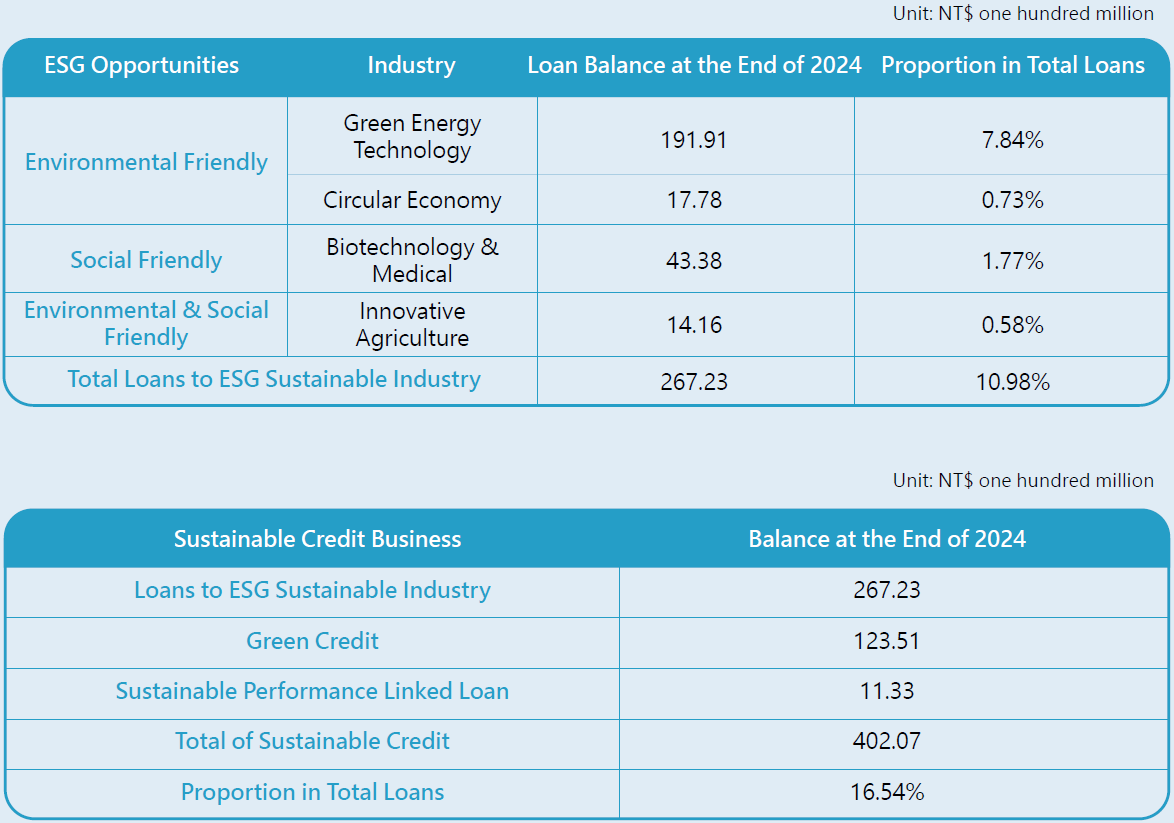
Project Financing
In light of the global goal of achieving "Net Zero Emissions," the development of renewable energy has become a crucial component. Apart from offering financial support for equipment, technology, and other requirements of renewable energy projects through general loans, KTB also promotes the development and implementation of project initiatives. From small and medium-sized solar power to the recent surge in offshore wind power, as of December 2024, the corresponding balance stands at NT$12.606 billion, which is equivalent to an annual carbon reduction benefit of approximately 230,300 tons. Based on the general carbon fee rate of NT$300 per metric ton announced by the Ministry of Environment, it is estimated that approximately NT$69.1 million in carbon fee costs can be reduced.
